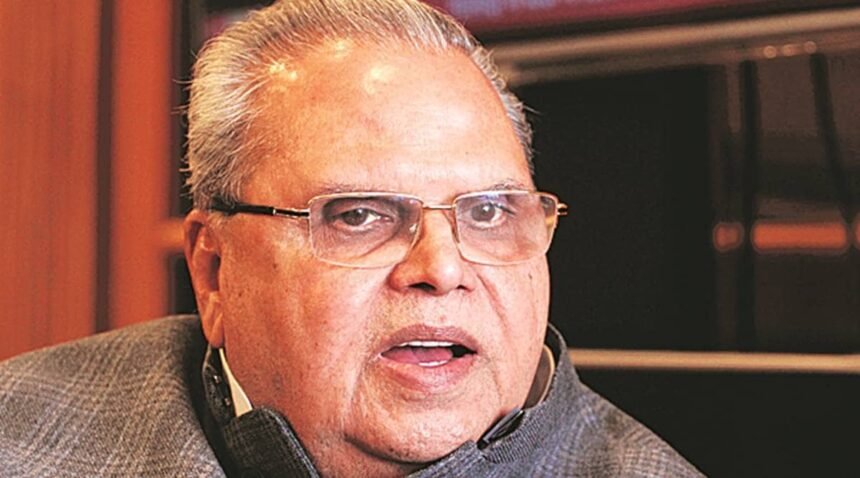The nation mourns the loss of Satya Pal Malik, a seasoned politician, former Union Minister, and the last Governor of the erstwhile state of Jammu and Kashmir. Known for his straightforward demeanor and fearless approach to politics, Satya Pal Malik passed away at the age of 79 after a prolonged illness. He breathed his last at Delhi’s Ram Manohar Lohia (RML) Hospital, confirmed by his personal secretary, K.S. Rana.
This isn’t just the story of his passing—it’s the story of a man who witnessed, influenced, and lived through some of India’s most historic political moments.
The Final Goodbye
On Tuesday, around 1 PM, the corridors of RML Hospital in New Delhi turned somber. After months of battling illness, Satya Pal Malik‘s journey came to an end. While his passing left a void in Indian politics, his legacy remains deeply etched in the country’s political fabric.
The Man Behind the Historic Abrogation of Article 370
If there’s one event that cemented Satya Pal Malik’s name in India’s political history, it was the abrogation of Article 370 on August 5, 2019. As the Governor of Jammu and Kashmir at the time, he presided over one of the most critical decisions in modern India—stripping the region of its special status.
This move was controversial, bold, and historic. Many remember Malik for the way he calmly navigated the political storm surrounding this decision. Today, as the nation marks the sixth anniversary of that monumental step, his passing feels even more symbolic.
From Student Leader to Political Stalwart
But who was Satya Pal Malik before becoming a national figure? His story started in the late 1960s, when he emerged as a fiery student leader. Known for his oratory and fearless attitude, he quickly caught the attention of senior political leaders.
In 1974, his closeness with Chaudhary Charan Singh paved the way for his entry into electoral politics. That year, Malik won his first election and became an MLA from Baghpat, Uttar Pradesh. It was the beginning of a political career that would span decades, crossing party lines and ideological divides.
Switching Political Gears
Over the years, Satya Pal Malik wore many political colors. He began with Chaudhary Charan Singh’s Bharatiya Kranti Dal and then moved to Lok Dal, eventually serving as the party’s General Secretary.
In 1980, he entered the Rajya Sabha representing Lok Dal but later switched to the Congress party in 1984. By 1986, he returned to the Rajya Sabha on a Congress ticket.
However, his journey in Congress was short-lived. After the infamous Bofors scandal during Rajiv Gandhi’s tenure, Malik’s loyalty to clean politics pushed him to resign from the party in 1987. He then joined V.P. Singh’s Janata Dal, marking yet another turning point in his career.
The 1989 Lok Sabha Victory
One of the most significant moments for Satya Pal Malik came in 1989 when he contested from Aligarh on a Janata Dal ticket. He won and went on to serve as the Union Minister of State for Parliamentary Affairs and Tourism.
This period was crucial—it allowed him to step onto the national stage, not just as a politician but as a leader who was unafraid to challenge the status quo.
Joining the BJP Under Vajpayee
In 2004, Malik joined the Bharatiya Janata Party (BJP) during the leadership of Atal Bihari Vajpayee. Although he contested the Lok Sabha elections from Baghpat, he lost to Rashtriya Lok Dal (RLD) chief Ajit Singh.
Yet, this loss didn’t dampen his political spirit. Instead, it opened new doors. His association with the BJP placed him in influential roles, including being appointed head of a parliamentary panel to review the contentious land acquisition bill during Narendra Modi’s first term as Prime Minister. Interestingly, his panel opposed the bill—leading to its eventual shelving.
Governor of Multiple States
Satya Pal Malik‘s gubernatorial career was as dynamic as his political one. He first served as the Governor of Bihar in 2017. Shortly after, in 2018, he was appointed the Governor of Jammu and Kashmir—a role that would define his legacy.
After the abrogation of Article 370, he was transferred to Goa, and later to Meghalaya, where he served until October 2022. Through these appointments, he developed a reputation for being candid and pragmatic—qualities that endeared him to some and ruffled feathers among others.
His Straightforward Nature
Malik was known for speaking his mind. Whether it was his criticism of certain government policies or his blunt statements about political corruption, he was never one to hold back. This earned him respect among political observers and ordinary citizens alike, who saw him as a rare leader unafraid of consequences.
A Political Career Marked by Resilience
If there’s one word that captures Satya Pal Malik’s career, it’s resilience. From switching parties to losing elections, from serving in Parliament to holding gubernatorial posts, he embraced every challenge as an opportunity. His ability to adapt while staying true to his principles made him one of India’s most intriguing political figures.
Legacy and Impact
With his passing, India has lost not just a political leader but a historical witness. Satya Pal Malik stood at the crossroads of India’s most defining political moments. His role in the abrogation of Article 370 alone guarantees him a place in the country’s political history books.
But beyond politics, his journey is a reminder that persistence, courage, and integrity are what truly define a leader.
Read More: Grey Market Premium Heats Up for JSW Cement IPO – Should You Apply?
Conclusion
The death of Satya Pal Malik marks the end of an era in Indian politics. From his days as a student leader to becoming the Governor who oversaw one of the most significant constitutional changes in modern India, his life was anything but ordinary.
His fearless approach, refusal to play safe, and unwavering belief in speaking his mind made him a unique figure in India’s political landscape. As we bid farewell to this stalwart, his story remains an enduring lesson in leadership, adaptability, and conviction.
And maybe, just maybe, the best way to honor him is not just by mourning his loss but by remembering his fearlessness in an era where speaking the truth is often a rare act of courage.







